Revolvers remain a solid choice for personal defense. Many citizens decide they need a handgun to protect the homestead or to carry concealed, and they often choose a simple revolver. Folks hiking and camping also like to have a handgun handy that has the utility to take on feral dogs and aggressive big cats. Not to mention the epidemic of crime along trails. For many who are unable to take an immersion class in handgunning, the revolver, with its simple manual of arms, is a good choice. But revolvers are not found only in the safes of beginners. Many experienced handgunners favor a revolver for certain chores. As a backup handgun, while camping, or for any day of the week, the revolver is a fine choice. Let’s find your best buy among three good handguns we recently tested.
Our first wheelgun was the Charter Arms Boxer 53620 38 Special, $349. Charter Arms rose to success during the Vietnam War by offering affordable but reliable revolvers at a fair price. Our research indicates it was either Colt or Smith & Wesson revolvers or cheap imports without affordable, reliable revolvers in the middle price range before Charter Arms came along. Charter Arms introduced what was then billed as the lightest steel-frame revolver. Charter accomplished this by designing a steel-frame chassis surrounded by an aluminum receiver, with aluminum used in the areas that are less stressed or that have reduced load bearing. Also, Charter Arms produced one of the first transfer-bar revolvers manufactured in America.
Next up were two revolvers chambered in 357 Magnum, but which also fire the 38 Special, the first being a Smith & Wesson Performance Center Pro Series Model 640 178044, $909. The Smith & Wesson 640 Pro is a concealed-carry double-action-only revolver. The hammer is concealed beneath the characteristic humpback frame. This revolver features a 2.125-inch-long barrel, yet it is heavier than the others at 22.5 ounces, mainly because of its stainless-steel frame and barrel.
The third gun of this trio and the second 357 Magnum is the Taurus Defender 605 2-60539NS, $467. Taurus has upgraded several of its revolvers to the Defender status. This is the same revolver as far as action, chambering, and capacity go, but with a 3-inch barrel compared to the shorter 2-inch barrel and with hand-filling grips. A tritium front sight is also added. The 856 six-shot 38 Special is the first of the Defender series, but the Defender 605 is a 3-inch-barrel five-shot 357 Magnum revolver with an exposed hammer. The revolver is more like the Smith & Wesson 640 Pro than the Charter Arms Boxer.
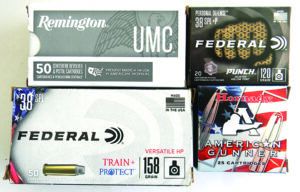
Before firing the handguns, we rounded up several choices of 38 Special ammunition. The majority of ammunition fired was Remington 130-grain full metal jackets. We also used Federal 158-grain Train & Defend, a standard-velocity lead hollow point. These are practice loads at low velocity, with low recoil. We also used two modern 38 Special defense loads, the Federal 120-grain Punch and the Hornady 125-grain XTP. We fired the Remington and Federal non-expanding loads in a combat course, using 25 rounds of each load in each revolver at 5, 7, and 10 yards. We fired for accuracy from a bench at 25 yards using the Federal 158-grain RNL load and the Hornady and Federal defense loads. Here’s what we thought of each handgun in more detail.
Gun Tests Grade: A (BEST BUY)
$349
The revolver tested is the new Charter Arms Boxer 38 Special. This is an outgrowth of the Charter Arms Bulldog revolver. Charter Arms has offered six-shot 32-caliber revolvers on the five-shot 38 frame and five-shot 32 Magnum revolvers, as well as various rimfire models. Charter Arms also offered a five-shot 44 Special revolver known as the Bulldog. The Bulldog features a deep frame and a 3-inch barrel. The larger frame accommodates a larger-diameter cylinder. The Bulldog revolver has also been offered with a five-shot 357 Magnum cylinder.
| Action Type | Double action/single action |
| Overall Length | 6.95 in. |
| Barrel | 2.2 in. |
| Sight Radius | 3.25 in. |
| Overall Height | 5.1 in. |
| Maximum Width | 1.5 in. |
| Weight Unloaded | 16.0 oz. |
| Weight loaded | 20.7 oz. |
| Cylinder Gap | 0.05 in. |
| Capacity | 6 |
| Frame | Aluminum |
| Barrel & Cylinder | Matte stainless steel |
| Frame Front Strap Height | 2.1 in. |
| Rear Strap Height | 3.2 in. |
| Grip | Checkered rubber |
| Grip Thickness Maximum | 1.2 in. |
| Grip Circumference Maximum | 5.1 in. |
| Front Sight | Fiber-optic dot |
| Rear Sight | Top receiver groove |
| Trigger Pull Weight Double Action | 12.9 lbs. |
| Trigger Pull Weight Single Action | 3.5 lbs. |
| Trigger Span | 3.3 in. |
| Safety | Internal transfer bar |
| Warranty | Limited lifetime |
| Telephone | (203) 922-1652 |
| Website | CharterArms.com |
| Made In | U.S. |
The Charter Arms revolver features a yoke design that doesn’t demand the hand fitting of some other revolver types. The ejector rod doesn’t lock up under the barrel; the only lock up is in the recoil-shield side of the ejector. The cylinder is released by pressing the cylinder latch forward.
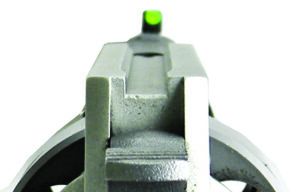
The Boxer is a 2.2-inch-barrel revolver with a six-shot 38 Special cylinder. The small-frame Undercover would not accommodate a six-shot cylinder as the Bulldog frame does. Considering the popularity of the revolver for personal defense and the 38 Special cartridge, this makes sense. The Boxer 38 Special revolver is primarily stainless steel with some anodized-aluminum components.
The cylinder locks up tightly enough, and the cylinder release operates in a positive manner. The hammer is serrated, allowing for easy cocking for single-action fire. Among the best features of this revolver are its hand-filling grips. These pebbled grips separate the unforgiving steel of the revolver frame from the palm. This results in less pain and discomfort when firing heavy loads.
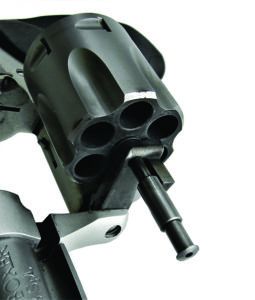
It is important to note that the Charter Arms action, unlike practically every other revolver action of the past century, isn’t based on Colt or Smith & Wesson lockworks. The Charter Arms action operates on proven principles, but it is unique in other ways. The action seems to have a shorter arc than the other revolvers. While trigger-pull weight before the hammer falls is measurable, the smoothness of the action is also important. The Charter Arms is a smooth-operating revolver. The single-action option is smooth and breaks cleanly at 3.5 pounds. This is considerably lighter than the 5.5 pounds of the Taurus single-action trigger.
We fired the Boxer on the combat course with one hand at 5 yards and two hands at 7 and 10 yards, all in rapid double-action operation. The Boxer features a fiber-optic front sight, which offers a good aiming point. The rear sight is a wide fixed trough in the top strap. The Charter Arms revolver is fast on target and offers good control. In combat ability, this handgun proved capable. We got on target and pressed the trigger straight to the rear, avoiding staging the trigger. The Charter Arms Boxer gave a slightly better showing than the Taurus 605 Defender. The Smith & Wesson revolver was more accurate in combat firing, largely due to its superior sights and heavier weight. In firing for accuracy from a bench, the Boxer punched some groups as small as 2.3 inches for five shots.
Our Team Said: The Charter Arms revolver proved to be the most accurate handgun from the bench. During speed-loading drills, the Boxer was smooth, and the ejector rod was long enough to eject spent cartridge cases in a positive manner. The Boxer is more than $100 dollars less than the Taurus and about $600 less than the Smith & Wesson. If you compare the revolvers as 38 Specials, the Boxer has a one cartridge greater capacity and is also the lightest tested. The fiber-optic front sight is a good choice, except in dim light.
38 Special Range Data
We fired five-shot groups at 25 yards from a benchrest position using an MTM Case-Gard K-Zone rest. We used a Competition Electronics Pro Chrony to measure velocity. The first screen of the chronograph was 10 feet from the muzzle of the firearms. The Charter Arms Boxer and Taurus Defender revolvers were fired single action. The Smith & Wesson is a double-action-only revolver and was fired DAO.| Federal Train & Protect 38 Sp. 158-grain LSWCHP | Charter Arms Boxer | Taurus Defender 605 | Smith & Wesson PC Model 640 Pro |
| Average Velocity | 730 fps | 777 fps | 756 fps |
| Muzzle Energy | 187 ft.-lbs. | 212 ft.-lbs. | 200 ft.-lbs. |
| Small Group | 2.5 in. | 2.75 in. | 3.0 in. |
| Average Group | 3.5 in. | 3.7 in. | 4.3 in. |
| Federal Punch 38 Sp. +P 120-grain JHP | Charter Arms Boxer | Taurus Defender 605 | Smith & Wesson PC Model 640 Pro |
| Average Velocity | 901 fps | 1002 fps | 934 fps |
| Muzzle Energy | 216 ft.-lbs. | 267 ft.-lbs. | 231 ft.-lbs. |
| Small Group | 2.3 in. | 3.0 in. | 3.1 in. |
| Average Group | 2.8 in. | 4.0 in. | 4.4 in. |
| Hornady American Gunner 38 Sp. 125-grain XTP | Charter Arms Boxer | Taurus Defender 605 | Smith & Wesson PC Model 640 Pro |
| Average Velocity | 880 fps | 891 fps | 867 fps |
| Muzzle Energy | 215 ft.-lbs. | 220 ft.-lbs. | 209 ft.-lbs. |
| Small Group | 2.3 in. | 2.4 in. | 3.0 in. |
| Average Group | 3.4 in. | 3.5 in. | 3.8 in. |


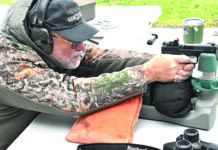
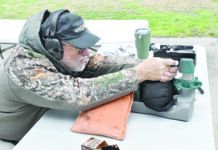
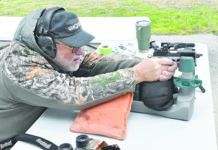
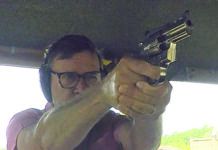
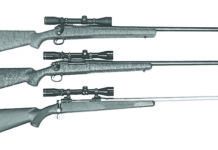
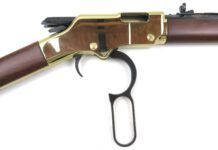
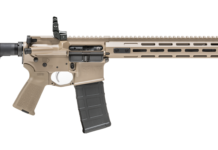
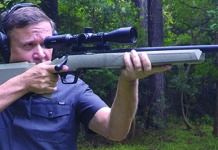





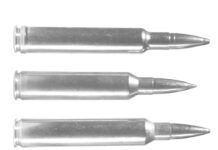
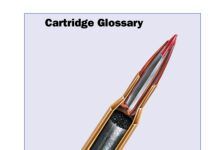
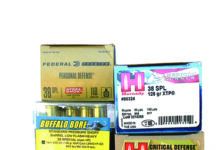
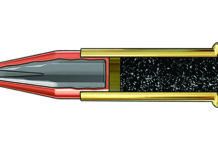
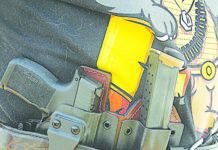






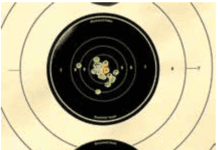
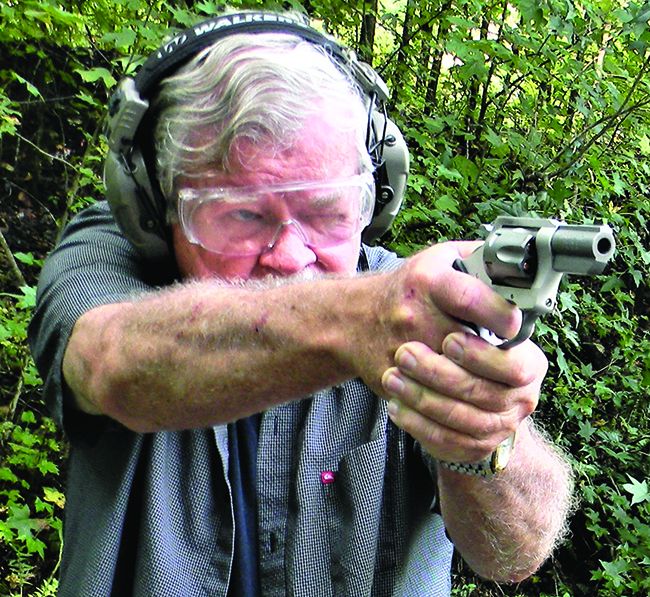

Todd,
You wrote “The ejector rod doesn’t lock up under the barrel; the only lock up is in the recoil-shield side of the ejector. ” This is not correct. The ejector rod locks into the frame forward of the cylinder. So the cylinder is held at the front and at the back. Before Charter had ejector shrouds this was easier to see, but can still be seen in the photo. This is a better design that the S&W where the forward lock is at the end of the ejector rod.
Charter’s web site states “Cylinder lock up is in three places instead of two: cylinder stop and ejector rod collar for additional safety, strength and cylinder-to- barrel lock up.” although I’m not sure what they mean by this.